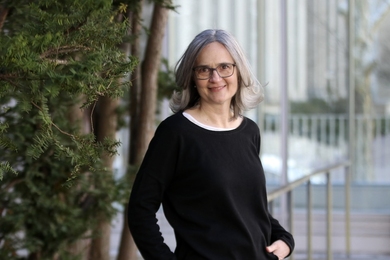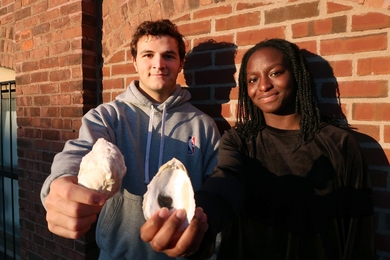Elizabeth (Ellie) Powers Boyle, garbed like her fellow graduates in black robe and mortarboard, happily accepted her diploma (an S.B. in electrical engineering and computer science) last week. But Boyle wore something else that was unique--four "brass rat" class rings, because she's a fourth-generation graduate of MIT.
"We thought it would make this special occasion more memorable to have Ellie wear all the family rings from MIT," said Ellie's mother, Melanie Powers (S.M. 1977 in management). "Unfortunately, Ellie's great-grandfather, Melville Powers, graduated before there were brass rats, so Uncle David lent his ring for the occasion."
The first Powers to attend MIT was Ellie's great-grandfather, Melville W. Powers, who earned the S.M. in naval architecture during World War I and stayed on at MIT for several years as a teacher. Eventually, he rose to the rank of commander in the U.S. Navy.
Both of Melville's sons, the late Donald Powers (S.B. 1943 in electrical engineering and computer science, S.M., E.E.) and David Powers (S.B. 1948 in physics), graduated from MIT.
"We're all very proud of Ellie," said Elizabeth's Uncle David. "I think her accomplishment is much more difficult than in my day. Competition to get into MIT is much more fierce, and the student body comprises some of the best scholars in the world."
The Powers' third-generation graduate was Ellie's mother, Melanie Powers. In addition to her Sloan degree, she earned a master's in education from Harvard as well as a master's in statistics and a Ph.D. in organizational behavior (both from Stanford).
"It's a remarkable accomplishment simply to graduate from MIT," said Beth Garvin, executive vice president and CEO of the MIT Alumni Association. "But a fourth-generation graduate is extremely rare and worthy of a great deal of pride for the Powers family."
David Powers, who served as his class secretary for several years, has seen a lot of changes at MIT. "The campus sure looks different," he said. And a look back at family members' transcripts "reveals how the academic focus of MIT has changed over the years," said Melanie Powers.
Much has stayed the same, however. "The intense work ethic is still there--that's the first thing that comes to mind," Melanie said. "Plus the shared sense of making a great personal sacrifice for the sake of a higher good. Then there's that profoundly ambivalent love-hate relationship that every undergraduate has with MIT."
Ellie's great-uncle concurred. "In my day, the phrase was 'Tech is hell,'" he said.
"The love-hate relationship is still there," Ellie said, pointing to the cryptic initials IHTFP on the 2004 version brass rat. "But the love for MIT usually wins out as the line between work and play eventually gets pretty blurry here."
Despite the tradition, Ellie says her family didn't exactly encourage her to attend MIT. "I have a lot of interests, so I think my mom thought I would grow to resent the heavy workload," she said, adding that she didn't think MIT would appeal to her. "I wanted the full college experience and I assumed MIT would be all study and nothing else. But that's not true."
But visits to campus eventually won her over. "People care about their work here, and particularly their causes. I considered a lot of schools and found the passion among MIT students was very unique--and very appealing," Ellie said.
And the workload? "Mom was right," she said with a laugh. "I thought I knew what hard work was until I came here. But the intensity is well worth it. There's no busy-work here. It's all applied knowledge. MIT stresses the strategic and the pragmatic as opposed to simply rote skills."
In looking back over her four years here, Ellie wishes she had had more time for extracurricular activities, though she enjoyed being a member of the Alpha Chi Omega sorority. She also became a member of the Society for Women Engineers and was active in Roadkill Buffet, MIT's improv comedy troupe. And this year she won the Institute's Louis Kampf Writing Prize for her thesis on "The Feminization of Teaching in America."
Ellie will soon begin work at Microsoft as a program manager. The job, one of five she was offered, will return her to her northern California roots. Eventually she'd like to start her own computer-related business. But if this doesn't work out, she has a backup plan.
"If the computer field for some reason loses its luster, I will become a world-renowned chocolatier, traveling to the ends of the earth to sample and evaluate the world's best chocolates. This is something that no computer can do," she said with a grin.
A version of this article appeared in MIT Tech Talk on June 9, 2004 (download PDF).






